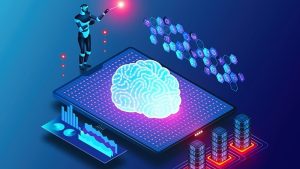On the Tech Transforms podcast, sponsored by Dynatrace, we talk to some of the most prominent influencers shaping critical government technology decisions.
The artificial intelligence (AI) age has arrived and the public sector is steadily moving forward with AI advancements. According to Gartner®, “annual global survey of over 2,400 CIOs and technology executives found that 25% of governments have deployed, or plan to deploy GenAI in the next 12 months. A further 25% plan to deploy in the next 24 months.”1 Within the U.S. federal government, agencies are leveraging AI tools for more than 700 use cases.
There are many ethical, societal, and workplace-related questions about this technology. During Episode 79 of the Tech Transforms podcast, Dr. Amy Hamilton joined us to discuss AI in the government. Dr. Hamilton is the visiting faculty chair for the Department of Energy (DOE) at National Defense University (NDU). She is also the DOE’s senior cybersecurity advisor for policy and programs. Our conversation aimed to help listeners get a better sense of how agencies can responsibly integrate AI.
Exploring the potential of AI in government
Dr. Hamilton shared a safe, real-world application of AI. During the university’s last Cyber Beacon conference, organizers presented both a human and an AI-generated abstract for panel sessions. Then, they let audience members guess which was which. “It was almost exactly 50/50,” Dr. Hamilton said. “People did not know the difference between AI-generated or human-generated content for these abstracts.”
However, considering the White House’s 2023 Executive Order issuing guidance and directives for AI in government agencies, Dr. Hamilton stressed the importance of properly testing the technology’s possibilities in a safe learning environment. This enables agencies to securely and ethically deploy these tools for tedious tasks — such as abstract writing — so that teams can focus on more strategic, higher-value projects that require human insights. In such an environment, the potential impact of AI appears limitless.
“We’re probably going to eventually look at the executive order and say, ‘Oh, we had a lot to learn,’” said Dr. Hamilton.
Getting the next generation of professionals excited about working for federal agencies
Reaching the full potential of AI in government — along with achieving other key federal IT modernization goals — will require recruiting talented and dedicated young people. However, the public sector faces a unique challenge: competing with private industry on salary compensation. Therefore, it’s essential to appeal to candidates about the value of the mission.
With her role at NDU’s College of Information in Cyberspace, Dr. Hamilton is directly contributing to educating and supporting the government’s work to attract and retain talent.
“What makes you come into the day and say, ‘I love this job. This is the job I want to be doing,’ and ‘I can’t imagine doing anything else’?” asked Dr. Hamilton. “The mission is super important. That’s what we can offer to people.”
 |
This episode of Tech Transforms discusses the growth of AI in the government, and how to leverage its full potential in a safe, ethical way. |
Tune in to the full episode for more insights from Dr. Amy Hamilton, the visiting faculty chair for the DOE at National Defense University and the DOE’s senior cybersecurity advisor for policy and programs.
Follow the Tech Transforms podcast
Follow Tech Transforms on Twitter, LinkedIn, Instagram, and Facebook to get the latest updates on new episodes! Listen and subscribe on our website, or your favorite podcast platform, and leave us a review!




Looking for answers?
Start a new discussion or ask for help in our Q&A forum.
Go to forum